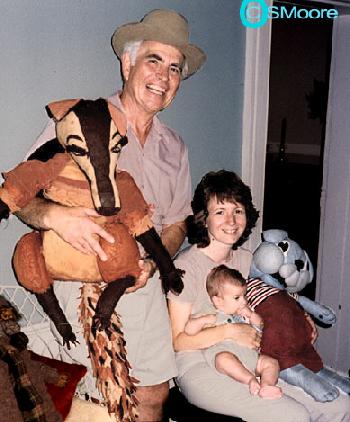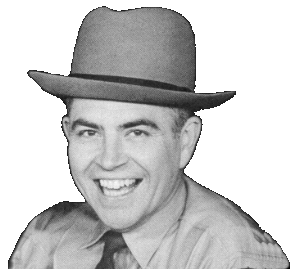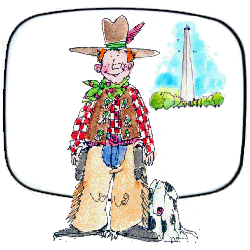For the aging population of local “baby boomers,” the memories of Channel
9’s “Ranger Hal Show” glow like campfire embers.
The once wide-eyed audience of area youngsters recall the rustic wood cabin
and the Ranger’s sidekick puppets, Oswald Rabbit, Dr. Fox and Eager Beaver,
perched, (or more appropriately, stuffed), on the window ledge;
the heard-but- never-seen Look-Out Scout, Scotty Irish; the grainy black-and-white
Walter Lantz cartoons; and always the affable “Ranger Hal” in relaxed command.
This was vintage children’s television in its awkward but golden simplicity.
“I
loved being the ‘Ranger,’ “says Hal Shaw,
who today at age 60 still beams the familiar grin and instant likeability
that made him a Washington TV kiddie show hero. He wistfully adds,
“It was freedom and creativity for 13 years.”
A visit with the old ranger in his Herndon, Va., home is an instant rewind
to those nostalgic times. There, the puppets sit cheerfully if uneasily
immobile on the sofa and his living room is crowded with citations and
awards, including three Emmy’s for “outstanding children’s programming’
— reminders of Shaw’s past popularity. His accomplishments, however, didn’t
begin or end with “Ranger Hal.”
.
Shaw arrived in Washington in 1957 with a drama degree from the University
of North Carolina and early fame as the first TV announcer/performer in
the state of Maine, where he ended up after exploring job possibilities
in New York City.
“In
those days people were hungry for television that stations could get advertisers
to sponsor ‘test patterns,’” he recalls. As
staff announcer at WTOP-TV (now WDVM), Shaw’s break came that first summer
he substituted for the vacationing Pick Temple whose Giant Ranch was then
a giant TV success. The advertising people at Schwinn Bicycles decided
to sponsor Shaw in a new children’s show, and he developed the ranger character.
“I
thought that a forest ranger stood for everything right and good,”
Shaw explains,
“and he had to know what he
was doing.” So, in addition to standard kiddie
fare, Shaw’s program provided an imaginary window to an outdoor world of
camping and nature, With fire prevention a perpetually “hot” topic, Smokey
the Bear was a frequent guest, to the delight of the U.S. Forest Service,
which made Shaw an Honorary Ranger.
“I bought the uniform at Sears, but the hat is authentic,” he
smiles. And the uniform still fits.
Weekends found the ranger packing a portable cabin into his station wagon
and exploring the local shopping centers. A jittery line of 1,000 anxious
children waiting to meet “Ranger Hal” was not unusual at his countless
personal appearances. “I learned a great respect
for children,” he says. “They
are true believers, and I was careful not to take advantage of their belief
in me.”
Unfortunately Shaw’s success began to sour when the show left the air in
1969 — bumped by a clown named Lorenzo. He was also forced to close an
unprofitable summer camp which he had established on the grounds of his
six-acre estate. Adjustment into a new (and adult) role as sales manager
for WTOP was, he admits, difficult. Then a brain aneurism ended his career
and forced untimely retirement in 1978.
.
 Hal
Shaw, Margaret Moore and the Moore's son Charlie in the Mid- 1980s
Hal
Shaw, Margaret Moore and the Moore's son Charlie in the Mid- 1980s
(Copyright,
Stephen
Moore)
|
However, the cruelest blow, in Shaw's view, fell on Thanksgiving Day 1983
when he lost Rosemary, his wife of 31 years, to cancer. “Rosie
was always the real talent in the family,” says
Shaw. Indeed she was a gifted soprano who, with their three children, performed
with him at many Christmas programs for the National Security Agency and
the Department of Agriculture.
Neurosurgery slowed the old ranger down but didn’t bring him to a halt.
He went back to school at Northern Virginia Community College, (NOVA),
graduating cum laude, and he is currently busy with creative writing courses.
And on New Year’s Day of this year (1985) he remarried. Says Shaw of his
new wife,
“Joan is very attractive and very
British.”
Shaw avidly follows the careers of “alumni” of his show including network
newsman Max Robinson, who began his career operating the puppets; Shaw's
first director graduated to “Sixty Minutes”; and another director who now
produces football games for CBS.
"And I still get a thrill meeting and hearing from fans,’
admits Shaw, "many of whom now have children
of their own. It excites me to know how much they enjoyed the program.
I’m continually amazed at the recognition. To think that I made that much
of an impression. But I guess the fact that I was on the air for 13 years
— I had to reach somebody.” |


















